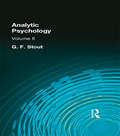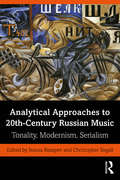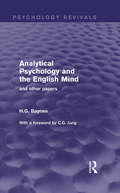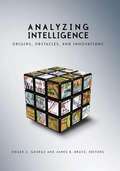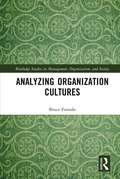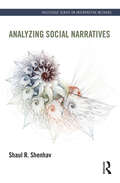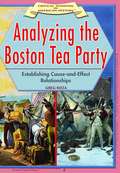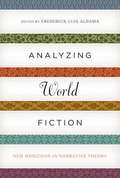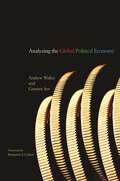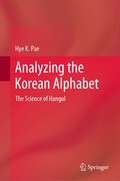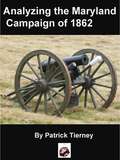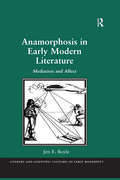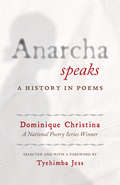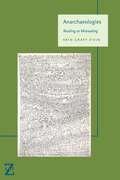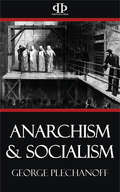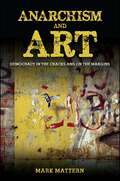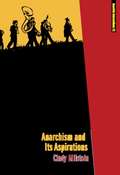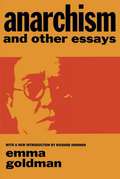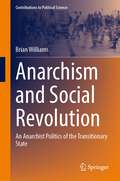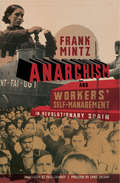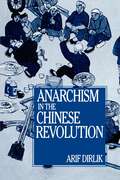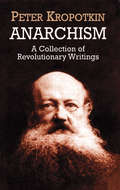- Table View
- List View
Analytic Psychology: Volume II
by G. F. StoutFirst published in 2002. Routledge is an imprint of Taylor & Francis, an informa company.
Analytical Approaches to 20th-Century Russian Music: Tonality, Modernism, Serialism
by Inessa Bazayev Christopher SegallThis volume brings together analyses of works by thirteen Russian composers from across the twentieth century, showing how their approaches to tonality, modernism, and serialism forge forward-looking paths independent from their Western counterparts. Russian music of this era is widely performed, and much research has situated this repertoire in its historical and social context, yet few analytical studies have explored the technical aspects of these composers' styles. With a set of representative analyses by leading scholars in music theory and analysis, this book for the first time identifies large-scale compositional trends in Russian music since 1900.The chapters progress by compositional style through the century, and each addresses a single work by a different composer, covering pieces by Rachmaninoff, Myaskovsky, Prokofiev, Shostakovich, Mansurian, Roslavets, Mosolov, Lourié, Tcherepnin, Ustvolskaya, Denisov, Gubaidulina, and Schnittke. Musicians, scholars, and students will find here a starting point for research and analysis of these composers' works and gain a richer understanding of how to listen to and interpret their music.
Analytical Psychology and the English Mind: And Other Papers (Psychology Revivals)
by H.G. BaynesOriginally published in 1950, the name of the late Dr H.G. Baynes was already well-known as a leading exponent of and translator of the writings of Professor C.G. Jung, as author and as psychotherapist. The essay which gives it title to this varied and interesting collection of writings, shows clearly Dr Baynes’s gift for illuminating a familiar subject with fresh insight drawn from his wide knowledge of the unconscious mind. He can make the unconscious real to us, and can convince us that myth and dream are expressions of vital problems of the human soul. The collection includes material to interest many types of reader, from The British Journal of Medical Psychology, from Folk-Lore, from The Society for Psychical Research. But perhaps most full of interest for the majority of readers are the first three chapters of an unfinished book – What It Is All About; here we find an admirable introduction, given with a wealth of illustration, to the main concepts of Professor Jung’s analytical psychology. Dr Baynes made Professor Jung’s thought his own, without loss of his own originality. He can touch with significance any subject on which he writes, whether it be the problem of the individual or the kindred problems of humanity.
Analyzing Intelligence: Origins, Obstacles, and Innovations
by Roger Z. George James B. BruceDrawing on the individual and collective experience of recognized intelligence experts and scholars in the field, Analyzing Intelligence provides the first comprehensive assessment of the state of intelligence analysis since 9/11. Its in-depth and balanced evaluation of more than fifty years of U. S. analysis includes a critique of why it has under-performed at times. It provides insights regarding the enduring obstacles as well as new challenges of analysis in the post-9/11 world, and suggests innovative ideas for improved analytical methods, training, and structured approaches. The book's six sections present a coherent plan for improving analysis. Early chapters examine how intelligence analysis has evolved since its origins in the mid-20th century, focusing on traditions, culture, successes, and failures. The middle sections examine how analysis supports the most senior national security and military policymakers and strategists, and how analysts must deal with the perennial challenges of collection, politicization, analytical bias, knowledge building and denial and deception. The final sections of the book propose new ways to address enduring issues in warning analysis, methodology (or "analytical tradecraft") and emerging analytic issues like homeland defense. The book suggests new forms of analytic collaboration in a global intelligence environment, and imperatives for the development of a new profession of intelligence analysis. Analyzing Intelligence is written for the national security expert who needs to understand the role of intelligence and its strengths and weaknesses. Practicing and future analysts will also find that its attention to the enduring challenges provides useful lessons-learned to guide their own efforts. The innovations section will provoke senior intelligence managers to consider major changes in the way analysis is currently organized and conducted, and the way that analysts are trained and perform.
Analyzing Organization Cultures (Routledge Studies in Management, Organizations and Society)
by Bruce FortadoCertain consultants argue leaders can quickly, easily, and considerably alter their organization cultures to improve performance. Conversely, field researchers have described situations where leaders could do little to alter the existing organization culture. Between these extreme positions, a spectrum of varying degrees of leader influence exists, and organizations fall at various places along this spectrum. This book presents five field studies dealing with team, service, and sales cultures where both expected and unexpected outcomes arose. In multiple instances, leaders hoped showing some employee appreciation would compensate for offering below market average wages. Several leadership groups were prospering based on cost cuts or increased sales. Those below often had their work intensified and they were experiencing greater stress. Eight paradoxical situations were uncovered and the interpretations of the participants were based in part on their personal work histories and the history of their current organization. In each case, evidence of employee informal organization and managerial operating cultures were documented. Analyzing Organization Cultures uses detailed case studies of five work organizations to offer a comparative approach to analyzing organizational culture. It shows the latest state of knowledge on the topic and will be of interest to researchers, academics, and students in the fields of organizational studies, management history, human resource management, and organizational theory.
Analyzing Social Narratives (Routledge Series on Interpretive Methods)
by Shaul R. ShenhavInterpreting human stories, whether those told by individuals, groups, organizations, nations, or even civilizations, opens a wide scope of research options for understanding how people construct, shape, and reshape their perceptions, identities, and beliefs. Such narrative research is a rapidly growing field in the social sciences, as well as in the societally oriented humanities, such as cultural studies. This methodologically framed book offers conceptual directions for the study of social narrative, guiding readers through the means of narrative research and raising important ethical and value-related dilemmas. Shenhav details three classic elements of narrative—text, story, and narration—familiar concepts to those in literary studies. To the classic trilolgy of terms, this book also adds multiplicity, a crucial element for applying narrative analysis to the social sciences as it rests on the understanding that social narratives seek reproduction and self-multiplicity in order to become "social" and influential. The aim of this book is to create an easy, clear, and welcoming introduction to narratology as a mode of analysis, especially designed for students of the social sciences to provide the basics of a narratological approach, and to help make research and writing in this tradition more systematic. .
Analyzing The Boston Tea Party: Establishing Cause-and-effect Relationships (Critical Thinking In American History)
by Greg RozaUsing the exercises and primary source documents in this engaging book, students will learn about key moments that led to the American Revolution. <P><P>These include the financial pressure on England after its resources were spread thin by the French and Indian War, the formation of the Sons of Liberty, the backlash and revolt of colonists in response to the Stamp, Sugar, and Quartering Acts, the tea party itself, and the eventual meeting of the first Continental Congress.
Analyzing World Fiction
by Frederick Luis AldamaWhy are many readers drawn to stories that texture ethnic experiences and identities other than their own? How do authors such as Salman Rushdie and Maxine Hong Kingston, or filmmakers in Bollywood or Mexico City produce complex fiction that satisfies audiences worldwide? In Analyzing World Fiction, fifteen renowned luminaries use tools of narratology and insights from cognitive science and neurobiology to provide answers to these questions and more. With essays ranging from James Phelan’s “Voice, Politics, and Judgments in Their Eyes Were Watching God” and Hilary Dannenberg’s “Narrating Multiculturalism in British Media: Voice and Cultural Identity in Television” to Ellen McCracken’s exploration of paratextual strategies in Chicana literature, this expansive collection turns the tide on approaches to postcolonial and multicultural phenomena that tend to compress author and narrator, text and real life. Striving to celebrate the art of fiction, the voices in this anthology explore the “ingredients” that make for powerful, universally intriguing, deeply human story-weaving. Systematically synthesizing the tools of narrative theory along with findings from the brain sciences to analyze multicultural and postcolonial film, literature, and television, the contributors pioneer new techniques for appreciating all facets of the wonder of storytelling.
Analyzing the Global Political Economy
by Andrew Walter Gautam SenIdeally suited to upper-undergraduate and graduate students, Analyzing the Global Political Economy critically assesses the convergence between IPE, comparative political economy, and economics. Andrew Walter and Gautam Sen show that a careful engagement with economics is essential for understanding both contemporary IPE and for analyzing the global political economy. The authors also argue that the deployment of more advanced economic theories should not detract from the continuing importance for IPE of key concepts from political science and international relations. IPE students with little or no background in economics will therefore find this book useful, and economics students interested in political economy will be alerted to the comparative strengths of political science and other social science disciplines. A concise look at the foundations of analysis in the political economy of global trade, money, finance, and investment Suitable for upper-undergraduate and graduate students with some or no economic background Techniques and findings from a range of academic disciplines, including international relations, political science, economics, sociology, and history Further reading and useful weblinks including a range of relevant data sources, listed in each chapter
Analyzing the Korean Alphabet: The Science of Hangul
by Hye K. PaeThis book provides comprehensive coverage of the Korean alphabet, Hangul, and includes a synthesis of research findings relating to reading in the non-Roman alphabet. This, in turn, contributes to the science of reading through an understanding of reading mechanisms that are essential for all writing systems, and that are particular for a given writing system. Hangul has been recognized as “the world’s best alphabet,” “one of the great intellectual achievements of Mankind,” and “alphabet’s epitome, a star among alphabets” by international linguists and historians. It is known that writing systems have evolved based on the ecological principle that visual signs are culturally selected to match objects found in natural scenes through selection pressures for optimal visual processing. However, Hangul is an exception. It was purposely invented by King Sejong in the 15th century to combat the illiteracy prevalent at the time. The chapters excavate the historical background of Hangul, and the unique characteristics of Hangul that contribute to learnability for emergent readers and efficiency for skilled readers. The author presents empirical evidence of psycholinguistic research into reading Hangul, building theories and presenting implications for the science of reading (psycholinguistics) and the science of writing (grapholinguistics). This book is relevant to students, researchers, and practitioners in applied linguistics, psycholinguistics, language studies, reading studies, and grammatology, with a particular focus on the Korean alphabet.
Analyzing the Maryland Campaign of 1862
by Patrick TierneyA short analysis of the decisions and actions that led to Gen Lee's invasion of Maryland in 1862
Anamorphosis in Early Modern Literature: Mediation and Affect (Literary and Scientific Cultures of Early Modernity)
by Jen E. BoyleAnamorphosis in Early Modern Literature explores the prevalence of anamorphic perspective in the seventeenth and eighteenth centuries in England. Jen Boyle investigates how anamorphic media flourished in early modern England as an interactive technology and mode of affect in public interactive art, city and garden design, and as a theory and figure in literature, political theory and natural and experimental philosophy. Anamorphic mediation, Boyle brings to light, provided Milton, Margaret Cavendish, and Daniel Defoe, among others, with a powerful techno-imaginary for traversing through projective, virtual experience. Drawing on extensive archival research related to the genre of "practical perspective" in early modern Europe, Boyle offers a scholarly consideration of anamorphic perspective (its technical means, performances, and embodied practices) as an interactive aesthetics and cultural imaginary. Ultimately, Boyle demonstrates how perspective media inflected a diverse set of knowledges and performances related to embodiment, affect, and collective consciousness.
Anandmath
by Bankim Chandra ChattopadhyayA novel set in the period of the sanyasi revolt in the late 1700s, banned in the British government period. One of the very important novels in the history of Indian literature, from pre-Independence era. This is the book from where national song of India, Vande Mataram, came from.
Anarcha Speaks: A History in Poems
by Tyehimba Jess Dominique ChristinaThe reimagined story of Anarcha, an enslaved Black woman, subjected to medical experiments by Dr. Marion Sims. Selected by Tyehimba Jess as a National Poetry Series winner.In this provocative collection by award-winning poet and artist Dominique Christina, the historical life of Anarcha is personally reenvisioned. Anarcha was an enslaved Black woman who endured experimentation and torture at the hands of Dr. Marion Sims, more commonly known as the father of modern gynecology. Christina enables Anarcha to tell her story without being relegated to the margins of history, as a footnote to Dr. Sims's life. These poems are a reckoning, a resurrection, and a proper way to remember Anarcha ... and grieve her.
Anarchaeologies: Reading as Misreading (Lit Z)
by Erin Graff ZivinHow do we read after the so-called death of literature? If we are to attend to the proclamations that the representational apparatuses of literature and politics are dead, what aesthetic, ethical, and political possibilities remain for us today? Our critical moment, Graff Zivin argues, demands anarchaeological reading: reading for the blind spots, errors, points of opacity or untranslatability in works of philosophy and art.Rather than applying concepts from philosophy in order to understand or elucidate cultural works, the book exposes works of philosophy, literary theory, narrative, poetry, film, and performance art and activism to one another. Working specifically with art, film, and literature from Argentina (Jorge Luis Borges, Juán José Saer, Ricardo Piglia, César Aira, Albertina Carri, the Internacional Errorista), Graff Zivin allows such thinkers as Levinas, Derrida, Badiou, and Rancière to be inflected by Latin American cultural production. Through these acts of interdiscursive and interdisciplinary (or indisciplinary) exposure, such ethical and political concepts as identification and recognition, decision and event, sovereignty and will, are read as constitutively impossible, erroneous. Rather than weakening either ethics or politics, however, the anarchaeological reading these works stage and demand opens up and radicalizes the possibility of justice.
Anarchism & Socialism
by George PlechanoffThe anarchist desire to abolish the State at one blow, and to abolish money, etc., in much the same way, springs from their inability to understand the institutions of capitalist society. To many of them the State is simply the result of people having faith in authority. Give up this belief and the State will cease to exist. It is a myth like God and rests entirely on faith. The anarchist's desire for the abolition of the State arises from entirely different concepts to that of the communists. To these anarchist anti-authoritarians the State is simply bad. It is the most authoritarian thing in sight. It interferes with individual freedom and consequently is the greatest obstruction to "absolute liberty" and other utopian desires of the champions of individualism.
Anarchism and Art: Democracy in the Cracks and on the Margins (SUNY series in New Political Science)
by Mark MatternSituated at the intersection of anarchist and democratic theory, Anarchism and Art focuses on four popular art forms—DIY (Do It Yourself) punk music, poetry slam, graffiti and street art, and flash mobs—found in the cracks between dominant political, economic, and cultural institutions and on the margins of mainstream neoliberal society. Mark Mattern interprets these popular art forms in terms of core anarchist values of autonomy, equality, decentralized and horizontal forms of power, and direct action by common people, who refuse the terms offered them by neoliberalism while creating practical alternatives. As exemplars of central anarchist principles and commitments, such forms of popular art, he argues, prefigure deeper forms of democracy than those experienced by most people in today's liberal democracies. That is, they contain hints of future, more democratic possibilities, while modeling in the present the characteristics of those more democratic possibilities. Providing concrete evidence that progressive change is both desirable and possible, they also point the way forward.
Anarchism and Its Aspirations
by Cindy MilsteinFrom nineteenth-century newspaper publishers to the protesters in the "Battle of Seattle" and the recent Greek uprising, anarchists have long been incited to action by the ideal of a "free society of free individuals"-a transformed world in which people and communities relate to each other intentionally and without hierarchy or domination. But what exactly would that look like, and how can we get there?Anarchism and Its Aspirations provides an accessible overview of the history and hopeful future of this vision for a better world. The book quickly brings even the uninitiated reader up to speed with a crash course on some of the most influential anarchists in history and their ideas about how we might achieve the transformation of society. From there, the book looks at how these principles have been put into practice by groups such as the Situationist International, social ecologists, Zapatistas, anti-globalization activists, and other directly democratic organizations and communities in their respective struggles against capitalism and state control.Laying out a clear introduction to some of the main ideas behind an often-misunderstood political philosophy, Anarchism and Its Aspirations helps us imagine the vast possibility of a truly free and democratic society.Cindy Milstein is an activist and educator from Vermont. She serves on the board of the Institute for Anarchist Studies, co-organizes the Renewing the Anarchist Tradition conference, and is a collective member at Black Sheep Books. Her essays have appeared in several anthologies, including Realizing the Impossible, Confronting Capitalism, and Globalize LiberationX.
Anarchism and Other Essays
by Emma GoldmanIn the 1890s and for years thereafter, America reverberated with the name of the "notorious Anarchist," feminist, revolutionist, and agitator, Emma Goldberg. A Russian Jewish immigrant at the age of 17, she moved by her own efforts from seamstress in a clothing factory to internationally known radical lecturer, writer, editor, and friend of the oppressed. This book is a collection of her remarkably penetrating essays, far in advance of their time, originally published by the Mother Earth press which she founded.In the first of these essays, Anarchism: What It Really Stands For, she says, "Direct action, having proven effective along economic lines, is equally potent in the environment of the individual." In Minorities Versus Majorities she holds that social and economic well-being will result only through "the non-compromising determination of intelligent minorities, and not through the mass." Other pieces deal with The Hypocrisy of Puritanism; Prisons: A Social Crime and Failure; The Psychology of Political Violence; The Drama: A Powerful Disseminator of Radical Thought; Patriotism: A Menace to Liberty; and The Tragedy of Woman's Emancipation. A biographical sketch by Hippolyte Havel precedes the essays.Anarchism and Other Essays provides a fascinating look into revolutionary issues at the turn of the century, a prophetic view of the social and economic future, much of which we have seen take place, and above all, a glimpse into the mind of an extraordinary woman: brilliant, provocative, dedicated, passionate, and what used to be called "high-minded."
Anarchism and Social Revolution: An Anarchist Politics of the Transitionary State (Contributions to Political Science)
by Brian WilliamsThis monograph provides an update to anarchist philosophy, advocating for a paradigm shift beyond neoliberalism and liberal democracy. The book’s central thesis has two components. First, it is argued that the maximization of equal liberty requires historical progress beyond the sovereign state system. In contrast to Fukuyama’s (1992) argument that liberal democracy is the end of history, it is argued that liberalism contains two contradictions (socioeconomic inequality and the shortcoming in equal liberty inherent to state power) with the potential to propel history further. This book’s argument – libertarian social democracy – provides a framework to guide that final stage of history. Second, while anarchist philosophy offers a vision beyond the sovereign state, it can be rendered more suitable as an alternative paradigm. Specifically, it is argued that anarchism is hampered by its traditional adherence to prefigurative strategy, according to which the state cannot be used as a means to achieve a free and equal society. By contrast, libertarian social democracy incorporates a role for a democratic transitionary state (described here as gradualist anarchism) thus addressing mainstream “Hobbesian” concerns about bad anarchy (where decentralization yields a net loss in equal liberty). In so doing, the book reveals the full spectrum of anarchist strategy from prefigurative to gradualist.
Anarchism and Workers' Self-Management in Revolutionary Spain
by Paul Sharkey Frank Mintz Chris EalhamThis is the first English translation of Frank Mintz's seminal study of the economic experiments put into place during the Spanish Revolution to both sustain civil society during the war and, more importantly, act as the material basis for a new society. These plans weren't developed by professional economists but grew out of a political movement that put working people at the fore and believed that the collectivized workplace would be the cornerstone of economic life. Includes a prologue by Chris Ealham, author of Anarchism and the City. A retired professor of Spanish, Frank Mintz lives in Paris, France, and is active with the CNT labor union.
Anarchism and Workers' Self-Management in Revolutionary Spain
by Paul Sharkey Frank Mintz Chris EalhamThis is the first English translation of Frank Mintz's seminal study of the economic experiments put into place during the Spanish Revolution to both sustain civil society during the war and, more importantly, act as the material basis for a new society. These plans weren't developed by professional economists but grew out of a political movement that put working people at the fore and believed that the collectivized workplace would be the cornerstone of economic life. Includes a prologue by Chris Ealham, author of Anarchism and the City. A retired professor of Spanish, Frank Mintz lives in Paris, France, and is active with the CNT labor union.
Anarchism in the Chinese Revolution
by Arif DirlikArif Dirlik's latest offering is a revisionist perspective on Chinese radicalism in the twentieth century. He argues that the history of anarchism is indispensable to understanding crucial themes in Chinese radicalism. And anarchism is particularly significant now as a source of democratic ideals within the history of the socialist movement in China.Dirlik draws on the most recent scholarship and on materials available only in the last decade to compile the first comprehensive history of his subject available in a Western language. He emphasizes the anarchist contribution to revolutionary discourse and elucidates this theme through detailed analysis of both anarchist polemics and social practice. The changing circumstances of the Chinese revolution provide the immediate context, but throughout his writing the author views Chinese anarchism in relation to anarchism worldwide.
Anarchism or Socialism?
by Joseph StalinThis volume depicts the happenings of events in Georgia in 1905-1906 by a group of anarchists against the Marxists.
Anarchism: A Collection of Revolutionary Writings
by Peter KropotkinOne of the few members of the Russian aristocracy to become a revolutionary, Prince Peter Kropotkin (1842-1921) renounced his title at the age of 12. He later became one of the leading theorists of anarchism. Forced to flee his homeland in the 1870s to avoid arrest for his revolutionary activities against the czarist government, the noted geographer and social philosopher lived in exile, mainly in England, for the next 42 years of his life. During this period Kropotkin wrote a number of pamphlets on the practical and moral aspects of the anarchist movement. Allowed to return to Russia in 1917, he continued to write but remained vigorously opposed to the Bolsheviks and Marxist socialism.This collection contains a number of his important writings, including the brief but moving "Spirit of Revolt"; "Modern Science and Anarchism," an investigation of the scientific principles of revolutionary anarchism; "Law and Authority," an argument for social control through custom and education; "Prisons and Their Moral Influence on Prisoners," an unparalleled description of the evils of the prison system (which Kropotkin witnessed during his incarcerations); a note on the 1917 revolution and the Soviet government; and five other documents. Also reprinted is Kropotkin's article for the Encyclopaedia Britannica, "Anarchism," widely considered the best statement in English on the meaning, history, and aims of revolutionary anarchism.A valuable addition to the libraries of instructors and students of history and government, this modestly priced volume also will appeal to anyone interested in aspects of anarchist thought.
